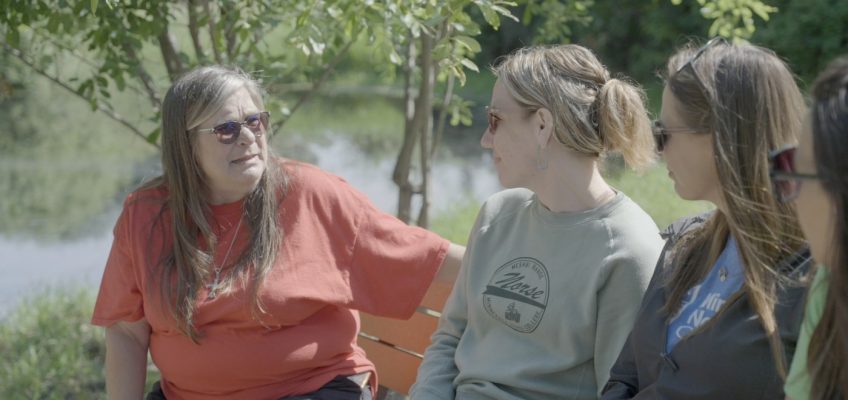Mary Kay Riendeau began to use marijuana, alcohol, and cigarettes at only 12 after surviving several instances of sexual violence. Resources were not abundant in the 1970s, and Riendeau’s trauma response dangerously spiraled into substance abuse that lasted 23 years.
Since she set out on the path to recovery in 1999, Riendeau has refused to let the pain of her past define her future. Today, as the department head of addiction studies at Minnesota North College-Mesabi Range, she is helping widen access to addiction counseling services in rural areas across the state.
“You know why people use?” said Riendeau., “The pain of life.”
She says expanding access to addiction counseling will help people get the support they need.
According to a 2024 Minnesota Department of Health report, residents of rural areas seeking mental health and chemical dependency treatment typically travel over three times longer to access care compared with urban patients. The same report shows that of the 4,156 alcohol and drug counselors across the state, only 4% work in isolated rural areas. Only 6% work in small towns.
Such disparities contribute to health inequity.
Faced with declining health and a looming prison sentence, Riendeau made the tough decision to stop using and turn her life around 26 years ago. She wanted to show up better as a mother, but also as the individual she knew she was under the shadow of her addiction. So, she enrolled in college.
Mary Kay Riendeau, far left, works with students enrolled in the Licensed Alcohol and Drug Counselor program at Minnesota North College-Mesabi Range. (Yasmin Yassin)
“I’m 61 years old,” she explained. “Am I going to let sexual violence ruin the rest of my life? There had to be a time in there where I made a decision.”
Her college, Minnesota North College, Mesabi Range, is home to an expansive Licensed Alcohol and Drug Counselor program (LADC), which was established in the 1990s. The program aims to effectively train students to enter the addiction-recovery field throughout the state by Zoom to remove the barriers that prevent many from completing their education. Rural areas such as the Mesabi Range have always faced great challenges with distance, affordability, and accessibility to addiction counseling.
Minnesota North College’s program addresses the shortage of addiction counselors in the area by integrating a real-world problem-solving curriculum into the classroom. Riendeau was a 2001 graduate of the program and started teaching in the program in 2004. In 2007, her mentor retired, and she has been the department head since then. There were only nine in the program that year. Even with the impacts that it was making, this shortage persisted in her community, so she sought out to expand existing initiatives.
Riendeau worked as a full-time, in-person LADC instructor at her alma mater for three years until she began to broaden the program’s efforts by using technology. In 2010 she launched free Zoom panels, accessible to people across the state. From Grand Portage to the Iron Range she says these “Zoom rooms” have allowed the program to reach thousands who have been touched by addiction.
This is “a way of putting people together in a community of recovery,” she said. Healed communities “can excel and do things which expands the empowerment of people.”
Riendeau has seen more and more students engage with the LADC program during her time as an instructor. The program’s instructors currently oversee the education of over 85 students. Thousands more have been licensed and are now active in the field of addiction work since her early beginnings.
Angela Tomassoni, left, Indigenous grant assistant at Minnesota North College-Mesabi Range, and Mary Kay Riendeau, department head of addiction studies at Minnesota North College-Mesabi Range, work to widen access to addiction counseling in rural Minnesota. (Brian Wiedeke)
Graduate Angela Tomassoni, who has faced addiction in the past, “gets goosebumps,” when reflecting on the program’s impact. She said it has transformed and saved countless people – including her. She now serves as the program’s Indigenous grant coordinator, and helps to oversee some of the millions of grant dollars that the program receives.
“These degrees and this experience was something that nobody could take away from me,” Tomassoni said. “Giving back and staying busy is a huge thing.”
Riendeau never anticipated her efforts reaching so far, but is grateful. After all, her main purpose in everything she has set out on has been to touch lives. Funding cuts threaten access to addiction services in rural communities, but Riendeau says her commitment is unwavering.
“We’re at a different time politically. But does it affect us? I’m not going to let it,” she said. “As long as we’re still there, there is still a voice fighting for addicts.”
Additional reporting by Legend Primus (Roseville High School) and Amelia Mohamud (Delano High School)
About this report
This story was produced as part of ThreeSixty Journalism’s Multimedia Storytelling Institute for high school students in partnership with Blue Cross and Blue Shield of Minnesota, which financially sponsors the camp and supports story sourcing. ThreeSixty Journalism is a multimedia storytelling program for Minnesota youth. Grounded in the principles of journalism and focused on contributing to more accurate narratives and representative newsrooms, ThreeSixty offers technical, ethical, and entrepreneurial training for fulfilling careers in storytelling and civic leadership. It has been housed at the College of Arts and Sciences at the University of St. Thomas since 2001.


Leave a Reply